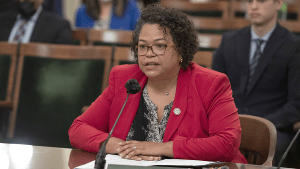By Sen. William Smith
The paramount strength of our state is our rich-growing diversity, and if we are to leverage that strength, we must act and think inclusively. The people we elect and the symbols we choose to surround ourselves with are critical to fostering such an inclusive environment. As Chair of the Judicial Proceedings Committee, I convened a committee of historians, activists, curators, academics, and archivists to commission an artist to create a portrait that would bring that vision to fruition. Together we selected West Baltimore Native Ernest Shaw, a product of Baltimore City Public Schools, Baltimore School for the Arts, Morgan State University and Howard University. Ernest’s talent and brilliance have given us a remarkable work of art – one that will inspire for generations to come.
Early this year we will install a portrait of a young Thurgood Marshall in the antechamber of the Judicial Proceedings Committee. The portrait will depict Marshall as he prepared to argue Murray v. Pearson, the case ultimately responsible for desegregating the University of Maryland Law School. Marshall’s likeliness will replace a portrait of Cecil Calvert, second Baron of Baltimore and the first Proprietor of Maryland, which contains an image of an enslaved child in the background; a wholly inappropriate image to be displayed outside of a committee dedicated to instituting colorblind justice.
Established in December of 1831 the Maryland Senate Judicial Proceedings Committee is the oldest standing committee in the General Assembly. The work of the committee reaches into the lives of every Marylander and, in many respects, shapes their prospects more intimately than any other element of government. But for far too long the legislators, the lawyers, and even the aesthetics of the committee have failed to reflect the rich diversity of our state. Today, despite jurisdiction over subject matter so crucial to people of color and those often-marginalized members of our society, there exists no portrait or any other artistic delineation of a person of color within the physical infrastructure of the committee itself.
A native of Maryland, Associate Justice Thurgood Marshall was a brilliant jurist who dedicated himself to racial and civil justice in our country. His legacy represents the perfect synthesis of intellect, compassion, tenacity, and forthrightness. The first African American to serve on the Supreme Court, it was perhaps the work he did before he came to our nation’s highest court that has proven to be most instructive to our contemporary challenges.
A portrait of a young attorney in the midst of his fight for civil rights will serve as a symbol of hope for all who would come to the committee in search of justice. His portrait, which will become a part of the permanent state-owned art collection, cared for in perpetuity by the State Archives, will send a message that even the most marginalized, the powerless, and those-oft-forgotten voices will be considered by the committee with equal weight as those with power and influence. Simply put, a portrait of this nature will create a more welcoming and accessible environment within the committee and, perhaps more importantly, it will inspire us to live up to our highest ideals.
Special acknowledgment must be given to State Archivist, Elaine R. Bachmann; the State Archives’ Senior Curator and Director of Artistic Property, Catherine Arthur; Director of the Study, Legacy of Slavery in Maryland, Chris Haley; Founding Director of the Center for Race and Culture at the Maryland Institute College of Art, Leslie King Hammond, PhD; Director of the Riversdale House Museum, Maya Davis; and Professor Larry Gibson for their time and expertise. This project would not have been successful without their participation and dedication.
Sen. William Smith serves District 20, which covers Montgomery County, Md. He has served in the Maryland State Senate since Dec. 21, 2016. Smith is chair of the Judicial Proceedings Committee, of which he’s been a member since 2016.
The opinions on this page are those of the writers and not necessarily those of the AFRO. Send letters to The Afro-American • 233 E. Redwood Street Suite 600G
Baltimore, MD 21202 or fax to 1-877-570-9297 or e-mail to editor@afro.com
Help us Continue to tell OUR Story and join the AFRO family as a member –subscribers are now members! Join here!
The post A portrait to inspire: why symbols matter and how a portrait of a civil rights pioneer will serve as a source of hope appeared first on AFRO American Newspapers .










